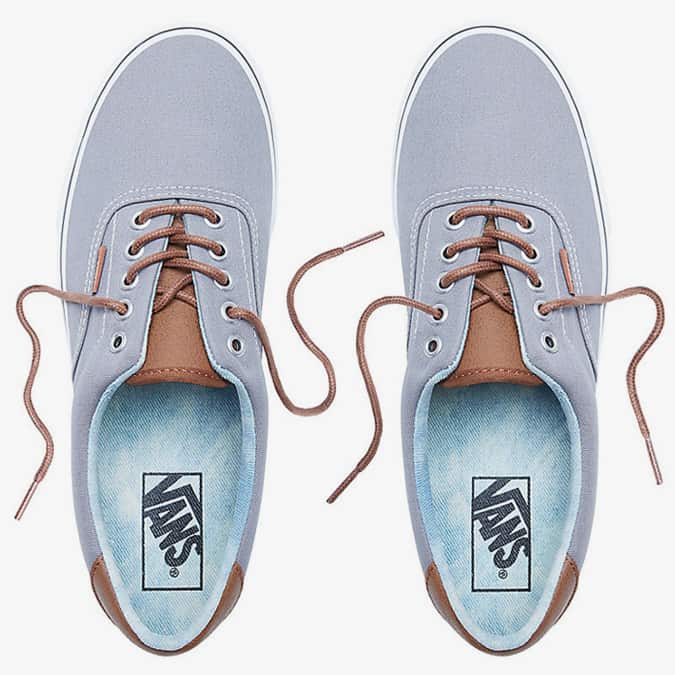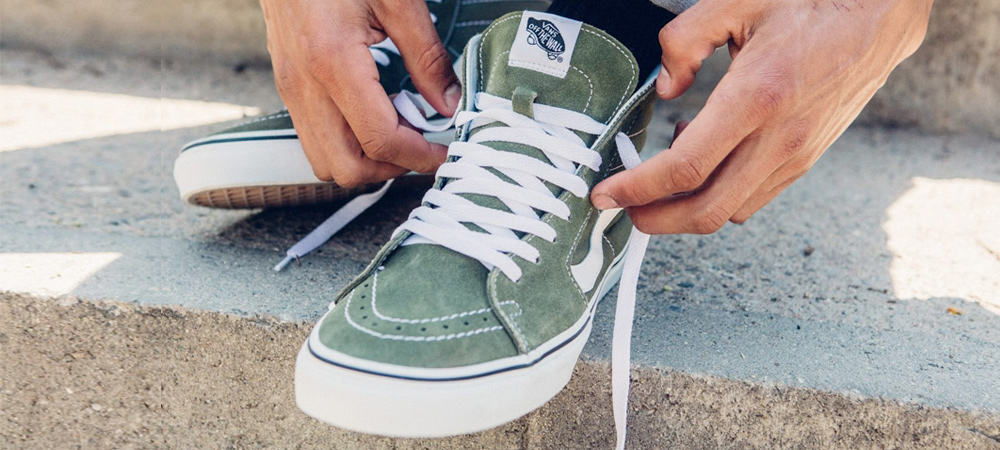If you’ve ever found yourself staring down haplessly at your new Sk8-His, with a set of shoelaces in one hand while using the other to scratch your head in puzzlement, this one’s for you.
Okay, in reality, this probably isn’t a situation you’ve ever had to contend with before, because when it comes to lacing our favourite shoes, 90 percent of us (not an official statistic) just leave them the way we found them when we first took them out of the box. However, paying a little more care and consideration to how you tie them can help elevate your footwear game to the next level.
Plus, if you want to keep your creps fresh, you should be in the habit of putting your laces in the washing machine every now and again. Especially if they’re white. The grime that builds up on laces can let your look down even if you’ve been liberal with the suede protector.
How To Lace Popular Vans Sneakers
Vans has produced literally thousands of variations over the past 50 years, and while some of them haven’t stuck around for very long, there are four key lace-up models that have truly stood the test of time. Some of them are arguably among the best sneakers of all time. Here’s how you should go about lacing all of them — and remember, there are certain lacing methods that suit some models more than others.
Vans Authentic
The Vans Authentic was the first shoe to be produced and sold by the legendary skate brand back in 1966. On its first day, it sold just 12 pairs, but today it’s one of the most popular trainers on the planet, and with good reason — it’s a style classic and can be dressed up or down with ease.
The Authentic has a basic canvas construction with a low profile and a signature waffle-tread sole. It also only features five eyelets on each side, which are fairly close together, meaning short laces are all that are required here. The lacing system is also closed at the bottom like an Oxford shoe, meaning that when you tie them up, you’ll get a neat, tight fit.
Use a flat lace in either black or white depending on the colour of the shoe, and thread it through so that it crisscrosses, over and under the eyelets, all the way up to the top where you can then tie it off into a neat bow.
The Steps
- Insert both lace ends downwards through the bottom two holes, leaving equal length on both the left and right laces.
- Looking down on the shoe, put the left lace through the top of the next hole on the right. It should now be crossing over the tongue.
- Mirror what you’ve just done, but with the other side, inserting the right lace through the top of the next hole on the left.
- Keep lacing in this manner, one side at a time, remembering to insert each lace down through the top of each hole. Mirror this process with your other shoe so that they both resemble each other.


Vans Era
Designed by legendary skateboarding pioneers Tony Alva and Stacey Peralta, the Era is basically a more padded update of the Authentic, but with subtle design tweaks.
The model retains the same canvas build and a very similar silhouette, but also features a padded collar and jazzier colour combinations, making it the shoe of choice for a new generation of skaters in the late 1970s.
Given its similarity to the Authentic, the Vans Era should be laced in much the same way. Although, due to the signature colour combinations, you have a little more scope to get creative with your laces.
The Steps
- Insert both lace ends downwards through the bottom two holes, leaving equal length on both the left and right laces.
- Looking down on the shoe, put the left lace through the top of the next hole on the right. It should now be crossing over the tongue.
- Mirror what you’ve just done, but with the other side, inserting the right lace through the top of the next hole on the left.
- Keep lacing in this manner, one side at a time, remembering to insert each lace down through the top of each hole. Mirror this process with your other shoe so that they both resemble each other.


Old Skool
The original chunky trainer and very first shoe to feature the now-famous Vans side stripe, the Old Skool is similar to the Era in terms of shape but with added panelling for increased durability while shredding it on a board.
With a mixture of suede and canvas construction and reinforced stitching in the most ollied areas, the Vans Old Skool was the most hard-wearing skate shoe of its day. It also boasts a few more eyelets than its predecessors, meaning you’ll need to go for a longer length of shoelace. Today it’s an undisputed classic silhouette, immune to the ups and downs of sneaker trends.
Either cross-lacing, like on the models above, or straight bar lacing are the best ways of tying things up. For the latter, thread the lace through the bottom set of eyelets and work up in an ‘S’ type pattern, leaving clean, horizontal lines on top and ensuring any other material stays hidden underneath the lace guards. This is a more complicated technique than cross-lacing, but results in a cleaner, more minimal look that complements the Old Skool’s silhouette.
The Steps
- Insert both lace ends downwards through the bottom two holes, leaving equal length on both the left and right laces.
- Looking down on the shoe, insert the left lace up and through the next right-hand hole, with its end pointing to the ceiling.
- Now put the right lace up and through the third eyelet on the left, skipping out the second. There should now be an empty hole on the left-hand side.
- Take what is now the right lace and cross it over, inserting it downward through the empty eyelet on the left. This should create another straight bar, mirroring the first.
- Do exactly the same with the left-hand lace and cross it over, inserting it downward through the empty eyelet opposite it. You should now have three bars.
- Keep lacing in this way, crossing each lace over to its opposite side to make new bars until you reach the top.


Sk8-Hi
The very first high-top skate shoe, the Vans Sk8-Hi brought a completely fresh look to the park when it was first launched in 1978. But it wasn’t all about aesthetics — this revolutionary new shoe offered skaters increased comfort, ankle support, and shielded their ankles from rogue boards.
With its high-top styling and eight eyelets on each side, the Vans Sk8-Hi needs a long lace in order to reach the top. You’ll need something more the length of a bootlace than a shoelace.
In terms of colour and style, flat laces look best with this particular model and white will work with pretty much any colour of shoe other than all black. Due to the height of this model, bar lacing will work best as it gives a more simple, pared-back finish — cross lacing is a little fussy in this instance.
Steps
- Insert both lace ends downwards through the bottom two holes, leaving equal length on both the left and right laces.
- Looking down on the shoe, insert the left lace up and through the next right-hand hole, with its end pointing to the ceiling.
- Now put the right lace up and through the third eyelet on the left, skipping out the second. There should now be an empty hole on the left-hand side.
- Take what is now the right lace and cross it over, inserting it downward through the empty eyelet on the left. This should create another straight bar, mirroring the first.
- Do exactly the same with the left-hand lace and cross it over, inserting it downward through the empty eyelet opposite it. You should now have three bars.
- Keep lacing in this way, crossing each lace over to its opposite side to make new bars until you reach the top.


History Of Vans
Now a staple fixture on the roads of Britain and beyond, the van was firs… Oh, hang on, wrong type of vans.
The confusion comes from the fact that as well as being a type of road vehicle used for transporting goods and people, Vans (with a capital ‘V’) is also a historic and highly-popular brand of American skate shoe.
It all started in 1966, when brothers Paul Van Doren and Jim Van Doren, along with partners Gordon Lee and Serge Delia, opened a shop in Anaheim, California, where they made and sold rubber-soled deck shoes to gnarly types on the West Coast.
As word spread from one empty Californian swimming pool to the next that these new shoes and their sticky waffle treads were rad for cruising bowls, more and more skaters began to descend on the Van Doren brothers’ little store to grab a pair for themselves.
Fast forward to the end of the 1970s, and Vans had 70 stores in California and was already starting to sell internationally. Demand never ceased, and today, especially with skate style enjoying a renaissance in recent years, the Vans brand is nothing short of a household name.
